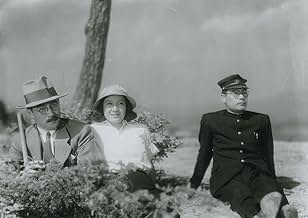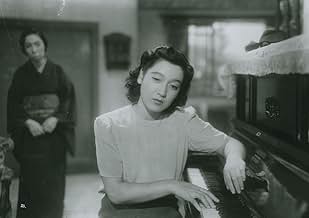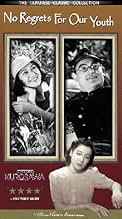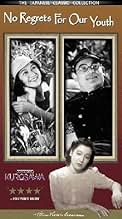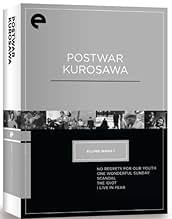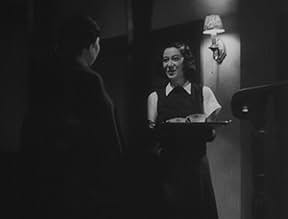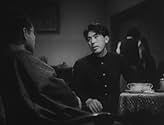Yukie, hija de un profesor universitario, se queda conmocionada cuando su padre es expulsado de su cátedra por sus enseñanzas políticas, pero mucho más aún cuando su novio es arrestado y eje... Leer todoYukie, hija de un profesor universitario, se queda conmocionada cuando su padre es expulsado de su cátedra por sus enseñanzas políticas, pero mucho más aún cuando su novio es arrestado y ejecutado bajo la acusación de espionaje.Yukie, hija de un profesor universitario, se queda conmocionada cuando su padre es expulsado de su cátedra por sus enseñanzas políticas, pero mucho más aún cuando su novio es arrestado y ejecutado bajo la acusación de espionaje.
- Dirección
- Guionistas
- Elenco
Opiniones destacadas
"No regrets for my youth" tells the story of the fight of some students against the militarist regime in Japan and their different destinies throughout the years, but the film focuses mainly on Yukie, that we see in the beginning, just as a spoilt girl, flirting with revolutionary games. She's very sensitive and soon notices how alienated from reality she is. The military government is slowly tightening its iron grip and silencing the opposition. Idealism has become dangerous in Japan.
Yukie now sees what's happening. She's very passionate in whatever she does. Yukie makes no compromises, but she's no fool either. The film will describe her journey - first, the fires of adolescence when the world seems to be out there just to fulfill her wishes, then self-awareness, fight, disillusion, suffering.... She and her friends will arrive to different conclusions and tread different roads.
In a way, "No regrets for my youth" is a coming of age film, in which politics, emotion and sex play an important role. Yukie wants to find her place in the world. She's not satisfied with her life and she's not satisfied with the world in which she's living. She wants to change them. "No regrets for my youth" shows how she tries to live up to her ideals.
In "No regrets for my youth" (as I said before) we feel the influence the Soviet (and Italian) masters had on Kurosawa. We see here a young Kurosawa - more spontaneous and enthusiastic (another Kurosawa film, more or less, along the same line is "Stray Dog" that takes place in post-war Japan). The camera is used effectively to show the landscape and people. The acting is more natural. We are spared the exaggerated gestures and movements that are seen in some of his later films. Setsuko Hara who plays Yukie is an extraordinary actress. She helps the film to achieve a truly great emotional depth. Highly recommended!
I was very impressed by how the film made the characters convincing in both the first act where they are college students, and then again nearly 10 years later. The characters have changed not only in appearance but in personality and mannerisms. It made the passing years very convincing.
The film is interesting from both an historical viewpoint and as a pure drama. This was made just a year or so after the Japanese surrender in World War II, and we get a good feel for how the militaristic government in Japan was able to gain the unquestioning support of most of the population. Some things never change, do they?
Highly recommended, although if you are starting out on Kurosawa, you may want to try something from the 1955 to 66 period.
Kurosawa's oeuvre is generally chided for being too male-focused, but in Yukie, his only female protagonist, he gives us one of his finest heroes. Her transformation over the course of the movie is brilliantly played by Setsuko Hara. Her mannerisms and expressions allow her character to age credibly, more so than other movies I can think of where the audience watches a character age over many years. Yukie is idealistic, but also practical and steadfast.
As a film, NO REGRETS is executed with flair: Kurosawa has yet to develop his own signature style fully at this point in his career. I found a lot of debt to Soviet and European art cinema on display here, especially in the montages. He is not yet the master filmmaker he would become, but this is an astonishing early effort, heartfelt and assured. But it would be a shame to only see this movie as a stepping stone towards better things, for it is a fine piece of work in its own right.
One character was inspired by the real-life Hotsumi Ozaki, who assisted the famous Soviet spy Richard Sorge and so became the only Japanese citizen to suffer the death penalty for treason during World War II. It is this aspect that makes the film particularly interesting, as it reflects on the role Japan played in the world from 1933-1945.
The film as a whole is interesting for being made so soon after World War II. Clearly the budget and production value is limited, but you might expect a country ravaged by war would be too busy with other things to make movies. Not so when you have a man named Kurosawa.
Five years later, Noge visits Professor Yagihara and his family under the custody of the now Prosecutor Itokawa and tells that he is going to China. Yukie decides to move alone to Tokyo and years later, she meets Itokawa in Tokyo and he tells that Noge is living in Tokyo. Yukie visits Noge and they become lovers.
In 1941, Noge is arrested accused of ringleader of a spy network and Yukie is also sent to prison. When she is released, sooner she learns that Noge died in prison and she decides to move to the peasant village where Noge's parents live and are blamed of being spies by the villagers. She changes her lifestyle and works hard with Madame Noge (Haruko Sugimura) planting rice and earning the respect of her mother and father-in-law. With the end of the war, freedom is restored in the defeated Japan and the flowers blossom again.
Japanese militarists used the Manchurian Incident as a pretext to press the public for support to invade the Asian mainland. Any opposing ideology was denounced as "Red". The Kyoto University Incident a.k.a. Takigawa Incident was one example of this tactic.
Using this historical event and the Japanese tradition as background, Akira Kurosawa released in 1946 the fictional "Waga seishun ni kuinashi" a.k.a. "No Regret for Our Youth" to disclose the lack of freedom in Japan of those years. I do not recall in this moment any other film of this great director with such strong female character. Further, Kurosawa seems to be influenced by Yasujirô Ozu disclosing the relationship of Yukie with her family first and with Noge's parents in the second half of his story. My vote is eight.
Title (Brazil): "Não Lamento Minha Juventude" ("No Regret for Our Youth")
¿Sabías que…?
- TriviaFilming in 1946, just after the war, many of the cast and crew were living very poor lives, going hungry quite often. One of the actors recalled a personal story of his stomach growling during filming, causing the scene to have to be shot again.
- Citas
Title Card: After the Manchurian Incident the militarists attempted to unify domestic opinions in order to realize their ambition to invade Asia. They denounced as "Red" any ideology that might hinder their policy. Professors and students fought the suppression. The Kyoto University Disturbance was one of their struggles for freedom.
- ConexionesFeatured in The Pacific Century: Reinventing Japan (1992)
Selecciones populares
- How long is No Regrets for Our Youth?Con tecnología de Alexa
Detalles
- Tiempo de ejecución
- 1h 50min(110 min)
- Color
- Mezcla de sonido
- Relación de aspecto
- 1.37 : 1

